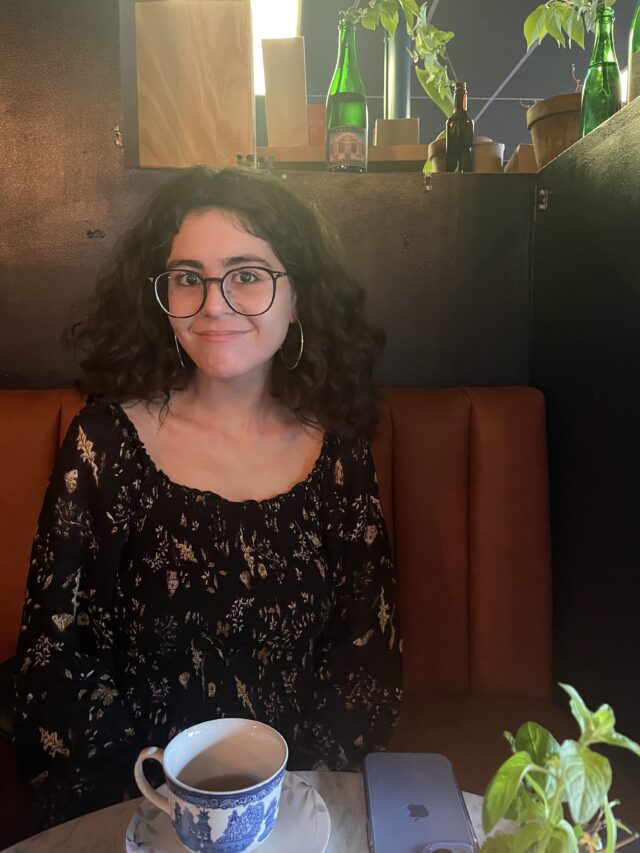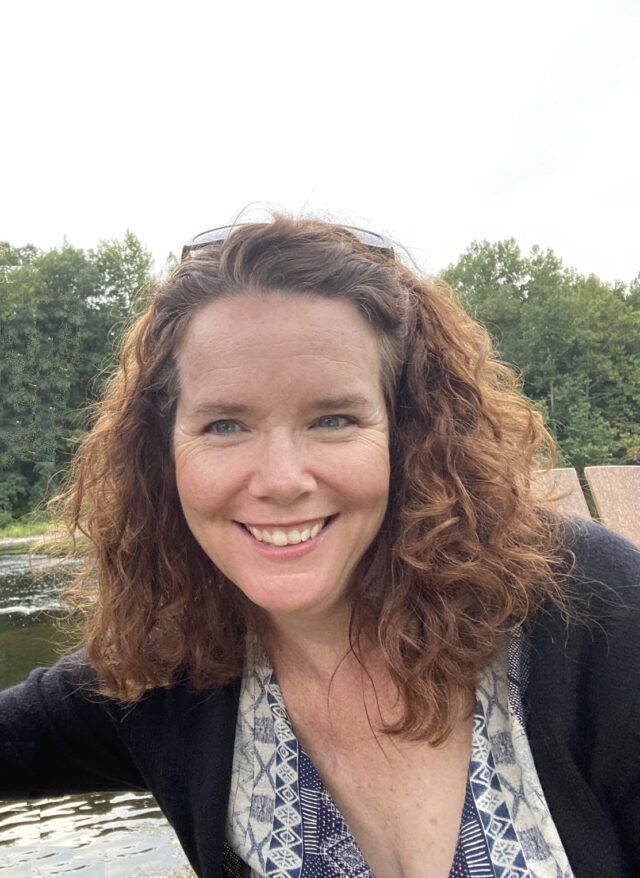Short Story Award Winners – Agency Review
WINNER – “Tell Me Who You Walk With” by Gabriella Navas
“Tell Me Who You Walk With” is revelatory fiction, a complex story that constellates what we owe each other, our families, ourselves. The author has an uncanny, almost preternatural ability to render a character’s emotional machinations with originality, precision, and the beautiful force of truth. I love how the writer applies pressure to Priscila from both near and far, and how the character is so deeply imagined that we long for her to find some semblance of shelter, knowing full well that storms are gathering speed and drawing near. —Guest Judge Bret Anthony Johnston

Sometimes, in moments like this, Priscila believed that Marie had been her older sister in another life: that it was Marie who’d taught her about all those things she found herself having to do in adolescence, like shaving her upper lip instead of tweezing it even if it meant the hair would grow back quicker, or figuring out which tampon size to use, or learning how to reduce the size of hickies with cold spoons and sábila.
Contact Information: gnicn73@gmail.com
Biographical Statement:
I am a Puerto Rican fiction writer hailing from Jersey City, New Jersey who now lives in Columbus, Ohio. My work has previously appeared in Quarterly West, The Masters Review, Fractured Lit, [PANK], Storm Cellar, and Sequestrum, among others. I am a current MFA candidate in Fiction at The Ohio State University, where I also served as Associate Fiction Editor for The Journal from 2024-2025, and where I was awarded the 2025 Helen Earnhart Fellowship Award in Fiction.
Beyond a collection of stories in progress, I am working on finishing my first novel, tentatively titled Soft Spots. Like the protagonist in Raven Leilani’s Luster, Edie, the protagonist of my novel, Mariana Correa, is—for lack of better phrasing—a messy bitch. In my time as a reader of literary fiction, I have always found that “messiness” is something reserved for white protagonists, whereas Latinx female characters are held captive by respectability politics, as well as by the responsibility to educate readers about the ubiquitous capital-S Struggle. Much like with my short fiction, in writing Soft Spots, I wanted to write the story of a young Puerto Rican woman who is not beholden to those impossible standards, but rather to the ones she makes for herself, flawed as they may be.
Encompassing themes of motherhood, liberal and conservative feminism(s), sex, capitalism and exploitation, belonging, and grief, Soft Spots has already attracted the attention of the small press Modern Artist Press. It is a project with much to say, and I believe that it has a long overdue place in the larger canon of Puerto Rican fiction written by female authors.
Personal website: https://linktr.ee/gee.navas
SECOND PLACE – “El Gallo de Oro” by Juan Fernando Villagómez
This terrific story feels both timely and timeless, laying bare a range of human desires—for connection, for love and purpose, for a future brighter than the past—and what characters will do and sacrifice in an attempt to satisfy them. There’s a powerful confidence in the prose, a conviction that the characters and their plights matter, which is such a pleasure to read. It’s an authentic and nuanced depiction of the border, a story that is poignant, profound, and necessary. — Guest Judge Bret Anthony Johnston
El Gallo de Oro was a cinderblock warehouse painted a brownish green. The bar name was stenciled on both corner walls and next to the words was a gold-feathered gamecock with a crimson comb, a gleaming black eye, one foot on the ground and a spur in the air.
Biographical Statement:
Juan Fernando Villagómez is not currently seeking representation.
Interview with the author at The Masters Review
THIRD PLACE – “The Lack of Noise” by L.J. Bowden
This is brutal and beautiful fiction, harrowing in ways that are at once original and universal. Scene by scene, page by page, the author raises the stakes for both the narrator and the reader, and the result is an unforgettable story that you read breathlessly. The author does an extraordinary job of rendering the particulars of the setting, signaling that this story could only happen where it does—another hallmark of top-tier work. — Guest Judge Bret Anthony Johnston

The rifle was long and lean—it had a dark chestnut stock that matched the kitchen table. Dad moved slow. He wound the window down ever so gently. I’d forgotten he could be that gentle.
Contact Information: lachyb2809@gmail.com
Biographical Statement:
I am a fiction writer from Adelaide, South Australia. My short stories have appeared in The Masters Review, West Trade Review, Going Down Swinging, and Swine. I was a finalist for The Masters Review Winter Short Story Award, The Best Australian Yarn, and the Phyllis Grant Zellmer Prize for Fiction.
I hold a first-class honors and bachelor’s degree in creative writing from Flinders University, South Australia, and am currently undertaking an MFA in creative writing at Boston University.
From growing up and working on farms in Australia, my fiction has often centered around the family dynamic in a rural space, and how the individual functions when this dynamic is threatened. After moving to various cities, my work has also explored the fragility of identity in relation to place, and the yearning to leave the community where one’s persona was forged. A common through line in my work is the role of desire and wanting when intersected with loneliness and guilt.
I intend to expand “The Lack of Noise” into a novel following the narrator, Vic, a fifteen year old boy from rural South Australia, who is disillusioned by the debasement of his parents when the family farm is lost to gambling, addiction, and depression. I intend to further explore his fraught relationship with rural identity and responsibility, manhood, desire and sexuality, and a longing to restore the family structure. The original piece establishes the rural setting and damaged family dynamic, and thus I intend to augment the debasement of the narrator’s parents as they decide to remain in the same relationship out of financial necessity. After the narrator attempts, but fails, to accept this, he will search for exterior connection and fraternity within the low socioeconomic housing unit—where the family relocated after losing the farm. Unable to connect with his mother and father, the narrator forms a complex mentor-student relationship with Trent, a single parent who lives with his elderly mother and six-month old baby. Here, Vic will find himself bonding with both Trent and the baby, feeling an urgent desire to help raise the child. While spending his school holidays around the housing unit, Vic navigates the pitfalls of addiction, boredom, loneliness, and a yearning for a different life, all while attempting to protect the innocence of Trent’s baby. An important factor of the novel will be the characters that form Vic’s empathy for the country, and simultaneously, his antipathy towards it. Having grown up and worked in Australian farming environments, I have a deep understanding and appreciation toward the people that inhabit such desolate and unforgiving spaces. In a pursuit to gain independence and freedom, Vic takes odd jobs given to him by the eclectic residents of the housing unit. However, in a quest for acceptance and recognition, whatever money Vic earns is given to his parents or to Trent and his baby. The rural township setting is of a low socio-economic standing, whereas many of the surrounding farms are owned by wealthy families, harboring an immense amount of generational wealth. The stark inadequacy on display is a constant reminder of the perennial struggle to escape poverty whilst being reminded of how much others have. For Vic, it is a reminder of the identity he and his family lost, and the new reality in which he has to form his adult persona.
In addition to “The Lack of Noise,” I am wanting to expand two of my longer short stories, written and workshopped whilst at Boston University, into a two-part novel. The first piece, “Date History,” is about a narrator viewing the emotional decline of his mother as she searches for a new partner after a divorce. A slurry of men—including a depraved truck driver, a pious Christian, and a sincere schoolteacher—filter through the mother’s condo, with none staying despite the narrator’s attempts to persuade them. The narrator’s father and brother are absent, having moved cities in pursuit of another life. “Date History” is about the internal guilt and desire an individual feels toward their parents’ happiness, and further, what the repercussions are on the individual’s own romantic relationships. The second piece, “Dad Skin,” is set at a later date, and follows the brother and father. After the suicide of the mother, and the consequential estrangement of the younger brother, the narrator of this piece (the older brother in “Date History”) continues to maintain a frail, but persistent, relationship with his father. The two navigate a lack of communication, loneliness, and an inability to address the trauma associated with their recently deceased mother. However, after a drunken evening, the narrator sleeps with the father’s new girlfriend and contracts an STD. During an internal debate over whether to tell his father, the narrator traverses Melbourne in search of meaningful connection and reasoning. Realizing he has developed romantic feelings toward the father’s girlfriend, the narrator spends one final night with her discussing the danger of desire against moral responsibility, and the role of guilt within a family. At their current states, the two pieces deal with the question of genetic fate and one’s ability to resist it. My goal is to combine the stories into a portrait of a family in decline, to further explore intergenerational trauma, the passing of guilt, and interrogate the fallibility of selflessness.
In addition to these novel ideas, I am writing and compiling a range of short stories for a collection, in which I intend to include my published work. The first piece is “Forty-Five Minute Walk,” a story about a woman in a rural town who has never been encouraged to acquire her driver’s license, and as a result walks to work everyday. She is a mother of five boys and a wife to the local pub’s head chef. One night, after she returns home from work, she is required to take the family dog to an emergency vet when it chokes on leftover pub food (purchase here or audio here). The second is “The Cough,” a slightly surreal piece where a narrator and his girlfriend are plagued by a persistent cough coming from their neighbor’s house. Driven to a state of insanity by a lack of sleep, the narrator attempts to evade the noise and maintain his decaying relationship. The final story is “Why Dead Fish Don’t Sink,” a piece from the perspective of a young girl on a beach holiday with her parents. During the story she navigates family dynamics, the reverberations of abuse, and the inevitable unravelling of her parents’ psyches (purchase here). The overarching aim of my collection is to explore how loneliness functions—specifically within a family or relationship—when exterior desires and yearnings eat away at the individual.
In addition to writing, I have worked as an editorial assistant for literary journals such as AGNI and Splinter. In these roles I have acted as an editor, proofreader, slush-pile reader, flat plan designer, and website editor (my profile at AGNI can be viewed here).
Interview with the author at The Masters Review
HONORABLE MENTION – “Eat All You Can” by Erin Striff
A waitress stood next to the bunny ice sculpture, pointing a remote control at the window shades, which kept lowering a couple inches, before clattering loudly and reversing. Drips were forming at the end of each of the ice bunny’s folded-down ears. Finally, the waitress gave up and moved a big glass bowl filled with ice and shrimp to a spot out of the glare. Mom caught my eye and grinned. All this money and they couldn’t stop the sun.
 Contact Information: striff@hartford.edu
Contact Information: striff@hartford.edu
Biographical Statement:
I’m a fiction writer whose short story collection and novel are both nearing completion. In addition to my short stories, I’ve published plays, poetry and commercial magazine articles, and I’ve also worked as a developmental editor. For over twenty years, I’ve taught creative writing, literature, and drama at the University of Hartford. I’m proud to say that one of the academic articles I’ve published was once rejected by a scholarly journal for being “too accessible.” I’m a recipient of a 2025 Connecticut Artist Fellowship for my short stories, which have appeared or are forthcoming in publications including Split Lip Magazine, Booth, Slippery Elm Literary Magazine and The Forge Literary Magazine. My story, “Tree Assassin,” was a finalist for the 2025 Slippery Elm Prose Prize; another story, “Sustainable Living,” was a finalist for the 2025 Peatsmoke Editor’s Prize in fiction. I’ve attended both Sewanee and the Community of Writers.
Born in Montana and brought up in California, I’ve lived in Pennsylvania, Colorado and for twelve years in the United Kingdom. I now live with my family in West Hartford, Connecticut, where I walk in the woods every day. Shaped as I have been by my changing surroundings, much of my work uses place and environment to exert pressure on my characters. This can be as specific as the 1989 San Francisco earthquake or as ubiquitous as the early heat wave in “Eat All You Can” in which a broken air conditioner becomes its own small disaster.
Current Projects:
Novel
My 85,000-word literary mystery with the working title of The Ghost Archive is set in San Francisco during two tumultuous periods: the 1934 Depression and General Strike, and the aftermath of the 1989 Loma Prieta earthquake. In 1934, Ruth is making ends meet by working in a seaside portrait studio until she meets Violet, a wealthy young student who, ignoring the skepticism of her professors and family, insists that photography is a valid art form and that women have a responsibility to share their vision. The unlikely partnership of Violet and Ruth leads to a series of haunting photographs and ends with Violet’s mysterious death.
In 1989, Ruth’s granddaughter Claire, an ambitious art historian, discovers evidence of lost photos that could make her career. In so doing, she exposes Ruth’s connection to Violet’s death. Ruth insists that the archive doesn’t tell the whole story, and uses the chaos following the earthquake to reclaim the photos that could tell the truth and make her name.
I am in the final revision process of the novel. Currently, I am getting some distance from it in order to more effectively edit the work before I submit it to agents.
Short Story Collection
In fall 2026, I will seek publication of my collection of literary short stories, tentatively entitled Fire Family (50,000 words). This work explores what we owe each other in an environment diminished and compromised by our own impact. In 2017, the Tubbs Fire destroyed 5% of the homes in Santa Rosa—the California town where I grew up. I watched as the victims gave glimpses of their losses in real time via social media—inspiring the first short story I wrote for the collection, “Fire Family.” Many of my stories take shape around a single environmental event, exploring how characters might navigate and try to repair our damaged world.
My collection explores the unequal burdens of climate change, which disproportionally affects marginalized or otherwise vulnerable populations. For example, “Cold Weather Protocol” is set in a near future in which winter temperatures are deadly for those who cannot afford shelter. A young unhoused woman must either prioritize surviving the night or helping an old man who was once her teacher. In “Fire Family,” an isolated man with few resources refuses to evacuate during a wildfire, choosing to protect his neighbors’ property (while posting about it on social media) hoping to win their approval.
I also use the compression of the short story form to explore what it means to make moral choices, under the pressure of a hostile and unpredictable environment. For example, in “Tree Assassin,” an arborist struggling to keep her business afloat is hired to poison a row of protected trees for profit. In “The Hundred-Year Flood,” a boy must decide whether or not to tell his family about his uncle’s check-fishing operation discovered in a flooded basement.
The stories take place in the mountains and the suburbs, in rural towns and futuristic cities. Some use humor, some are more reflective. They all acknowledge the fragility of our world, but none abandon hope. Five of the stories have been published in literary journals, two are complete and on submission, three are under revision and two are in development.
